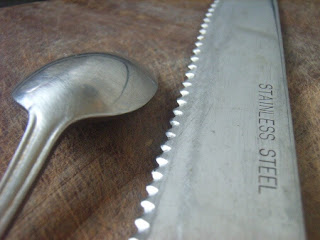Carbon Steel and Stainless Steel
Difference between Carbon Steel and
Stainless Steel
Carbon steel and stainless steel are metal alloys i.e. these are metals that are formed by combining two or more metal elements to enhance certain properties such as strength and reactivity.
Each is suitable
for specific applications.
For instance,
knives are made from both carbon steel and stainless steel and people prefer
either of the two for specific situations.
The following is a
look at the difference between these two metal alloys to help you choose the
correct knife for your needs.
Definitions
Carbon steel is
a metal alloy of carbon and iron that has a relatively low tensile strength
whose surface hardness can be increased through carburizing.
The amount of carbon used is usually less than 2 percent
and no other metal elements are added.
Carbon steel is the most abundantly produced of all steel
products.
It has a wide range of applications in the motor and
electrical appliances sector due to its ferromagnetic nature.
Stainless steel is a metal alloy consisting of iron and chromium.
The amount of chromium used with the iron usually varies
from a minimum of 10 percent to 30 percent depending on the desired quality of
the final product.
Some other elements such as titanium and nickel may be
added to enhance specific qualities of steel.
Unlike other metals, stainless steel does not rust or
corrode.
Comparison Chart
Carbon Steel
|
Stainless Steel
|
An alloy of iron and carbon
|
Alloy of iron and chromium
|
Can rust
|
Doesn’t rust
|
Hard and wear-resistant
|
Softer. The knife will not stay sharp for long.
|
Brittle
|
Non-brittle
|
Carbon Steel vs Stainless Steel
What
is the difference between carbon steel and stainless steel?
The difference lies in their composition, uses, and
whether they rust or not.
If you are looking to choose between
a carbon steel knife and a stainless steel knife, here is a short guide.
Both types of knives can do the job, but each has its own
advantages.
A carbon steel knife is made from a mixture of iron and
carbon. This means that it can rust.
However, carbon steel is a strong metal and therefore
gives the knife a good measure of strength that you might need in some tasks.
It also means that when sharpened, a stainless steel knife
won’t stay sharper for longer than a carbon steel knife, which is more wear
resistant.
In addition, although carbon steel is stronger than
stainless steel, it is much easier to sharpen than stainless steel.
This is an important characteristic in making knives since
knives don’t stay sharp enough for long if they are used frequently.
Stainless steel is made from chromium and iron.
The chromium used gives it its anti-corrosiveness and
aesthetic appeal. This makes it easy to use in moist environments.
For most kitchen users, stainless steel knives are good
enough, especially since they can be left unclean for a relatively long period
without rusting and can be cleaned very easily later.
Carbon knives are fragile to take
care of because of the brittleness of the carbon in them.
They can easily chip when dropped or tossed into the
dishwasher.
The can easily rust or stain.
They cannot stand prolonged exposure to dirt or food since
they can react to the food and become discolored or rusty.
Video
Here
is a video that discusses the differences between carbon steel knives and
stainless steel knives:
.You might also like:
CLICK HERE . . .
CLICK HERE . . .
CLICK HERE . . .
CLICK HERE . . .
CLICK HERE . . .
.
 |
Multi-Media Filter, Highly-Activated Carbon Filter,
Zeolite-Process Water Softener With Brine Tank,
Fiberglass Ballast-Type Pressure Tank
(fully automatic backwash & regeneration)
|
PURICARE
Water
Treatment
Systems
.
.
...
Aganan, Pavia, Iloilo, Philippines
...
CLICK HERE . . . to view company profile . . .







No comments:
Post a Comment